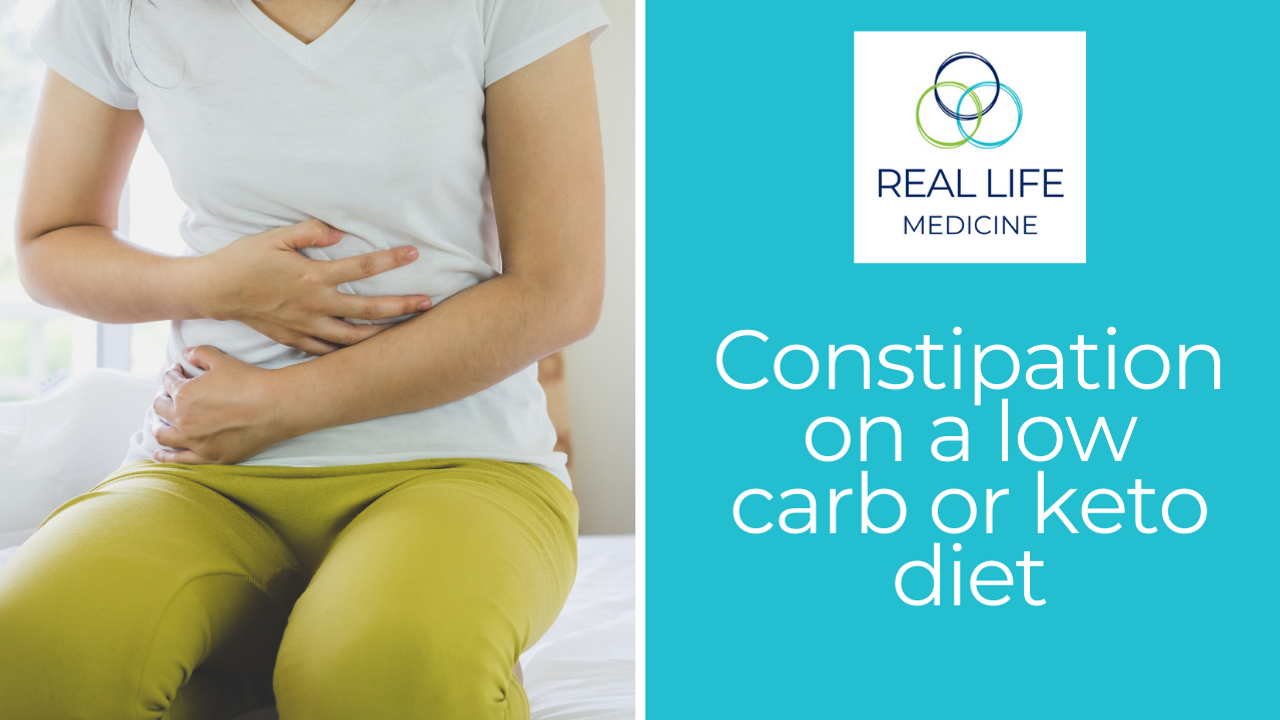
10 Things to help with constipation on a low carb or keto diet
May 25, 2022A change in bowel habits is common with any change in diet.
When starting a low carb or ketogenic lifestyle the reduction in carbohydrates can result in either constipation or diarrhoea.
It is important to note that any change in bowel habit that doesn’t resolve needs investigation as this is one of the most common signs of bowel cancer.
Using our bowels is quite a complicated process. It involves ensuring the colon (the large bowel) is moving properly (peristalsis), there is adequate fluid in the colon and that the anal sphincters are working well with no haemorrhoids or fissures.
Why do we get constipation with a low carb or keto diet?
Constipation is defined as difficulty passing hard stools.
The first thing that happens on a low carb or keto diet is that the reduction in carbs results in the reduction in fibre. Fibre is a bulking agent, meaning it bulks up the stool making more poop. Many people find that with less fibre they have reduced frequency and reduced amount of poop but that is soft and easy to pass. This is not constipation.
If you have hard, difficult to pass stools after reducing your carbs, here are some options.
1/Water
Ensure you are drinking enough water. One of the jobs of the large bowel is to reabsorb water. Ketosis causes a diuresis, meaning you wee more, and so can be dehydrated. This water needs to be replaced.
2/ Salt
When starting a low carb or ketogenic diet, salt is excreted in the urine. This needs to be replaced as sodium deficiency results in dehydration.
3/Fibre
Whilst the role of fibre is controversial, if you have gone from a high fibre diet to a low fibre diet, the result is often constipation. This is a result of the gut microbiome. We know the gut microbiome ferments fibre and produces short chain fatty acids. For some people adding fibre during the transition phase can be helpful. Fibre can be found in cruciferous vegetables. Psyllium husks can be added to meals or bought in capsules. There is a product called Benefiber which can be helpful. Avoid products like Metamucil which have colouring and sweeteners added.
4/ Magnesium
A large proportion of the human population is magnesium deficient. There are many types of magnesium available but for constipation, we recommend magnesium citrate Magnesium citrate can stimulate peristalsis and get the colon moving.
5/ Fermented Foods.
Fermented foods such as sauerkraut, kimchi, yoghurt and kefir can diversify the microbiome. The key to an active healthy gut is microbiome diversity. It is important though to add fermented foods in small amounts and increase slowly.
6/ Dairy
For some people, dairy can be constipating. Try reducing dairy.
7/ Coconut oil.
In the old days’ constipation was treated with a dose of cod liver oil. Adding coconut oil can stimulate the bowel. The dose needs to be added slowly. Start with a teaspoon. Too much, too quickly can result in nasty accidents!
8/ Caffeine
Caffeine stimulates peristalsis. A hot coffee or a strong cup of tea in the morning. can get things moving.
9/ Medication
If you do need to use a medication, something short term like Senna or Coloxyl or a combination works well as a stool softener and a gentle increase in peristalsis. Remember any laxative should be a short term option, long term use damages the bowel.
10/ Routine
Our bodies love routine. Most people don’t give their body enough time to do its job. They’re up and out the door. Slowing down in the morning and sitting on the loo after breakfast or coffee for a good 5 minutes helps the bowel empty.
Things to avoid for treatment of constipation on a low carb and keto diet.
1/ Prune juice
This is high in sugar and there are plenty of other options.
2/ Dried fruit
See above.
3/ Double D Lollies or any sugarless lollies
These are full of chemicals that irritate the bowel. Many sugar free lollies and gum contain sugar alcohols that irritate the gut in large amounts. Sugar alcohols include sorbitol, maltitol and even xylitol and erythritol can be irritating for some people.
4/ Lactulose
This is high sugar syrup and unhelpful.
5/Metamucil
See the fibre section.

